|
upm
0.8.0
Sensor/Actuator repository for libmraa (v1.1.1)
|
|
upm
0.8.0
Sensor/Actuator repository for libmraa (v1.1.1)
|
API for the BMG160 16 bit Trixial Gyroscope. More...
The BMG160 is a 3-axis angular rate sensor that is made of a surface micro machined sensing element and an evaluation ASIC. Both parts are packed into one single LGA 3.0mm x 3.0mm x 0.95mm housing. The BMG160 is designed to meet requirements for consumer applications such as image stabilization (DSC and camera-phone), gaming and pointing devices. It is capable to measure angular rates in three perpendicular room dimensions, the x-, y- and z-axis, and to provide the corresponding output signals. The BMG160 is fitted with digital bi-directional SPI and I2C interfaces for optimum system integration.
Not all functionality of this chip has been implemented in this driver, however all the pieces are present to add any desired functionality. This driver supports both I2C (default) and SPI operation.
This device requires 3.3v operation.
Public Types | |
| enum | BMG160_REGS_T : uint8_t { REG_CHIP_ID = 0x00, REG_RATE_X_LSB = 0x02, REG_RATE_X_MSB = 0x03, REG_RATE_Y_LSB = 0x04, REG_RATE_Y_MSB = 0x05, REG_RATE_Z_LSB = 0x06, REG_RATE_Z_MSB = 0x07, REG_TEMP = 0x08, REG_INT_STATUS_0 = 0x09, REG_INT_STATUS_1 = 0x0a, REG_INT_STATUS_2 = 0x0b, REG_INT_STATUS_3 = 0x0c, REG_FIFO_STATUS = 0x0e, REG_GYR_RANGE = 0x0f, REG_GYR_BW = 0x10, REG_LPM1 = 0x11, REG_LPM2 = 0x12, REG_RATE_HBW = 0x13, REG_SOFTRESET = 0x14, REG_INT_EN_0 = 0x15, REG_INT_EN_1 = 0x16, REG_INT_MAP_0 = 0x17, REG_INT_MAP_1 = 0x18, REG_INT_MAP_2 = 0x19, REG_INT_1A = 0x1a, REG_INT_1B = 0x1b, REG_INT_1C = 0x1c, REG_INT_1E = 0x1e, REG_INT_RST_LATCH = 0x21, REG_HIGH_TH_X = 0x22, REG_HIGH_DUR_X = 0x23, REG_HIGH_TH_Y = 0x24, REG_HIGH_DUR_Y = 0x25, REG_HIGH_TH_Z = 0x26, REG_HIGH_DUR_Z = 0x27, REG_SOC = 0x31, REG_A_FOC = 0x32, REG_TRIM_NVM_CTRL = 0x33, REG_SPI3_WDT = 0x34, REG_OFC1 = 0x36, REG_OFC2 = 0x37, REG_OFC3 = 0x38, REG_OFC4 = 0x39, REG_TRIM_GP0 = 0x3a, REG_TRIM_GP1 = 0x3b, REG_BIST = 0x3c, REG_FIFO_CONFIG_0 = 0x3d, REG_FIFO_CONFIG_1 = 0x3e, REG_FIFO_DATA = 0x3f } |
| enum | INT_STATUS_0_BITS_T { _INT_STATUS_0_RESERVED_BITS = 0xf0 | 0x08 | 0x01, INT_STATUS_0_HIGH_INT = 0x02, INT_STATUS_0_ANY_INT = 0x04 } |
| enum | INT_STATUS_1_BITS_T { _INT_STATUS_1_RESERVED_BITS = 0x0f, INT_STATUS_1_FIFO_INT = 0x10, INT_STATUS_1_FAST_OFFSET_INT = 0x20, INT_STATUS_1_AUTO_OFFSET_INT = 0x40, INT_STATUS_1_DATA_INT = 0x80 } |
| enum | INT_STATUS_2_BITS_T { _INT_STATUS_2_RESERVED_BITS = 0xf0, INT_STATUS_2_ANY_FIRST_X = 0x01, INT_STATUS_2_ANY_FIRST_Y = 0x02, INT_STATUS_2_ANY_FIRST_Z = 0x04, INT_STATUS_2_ANY_SIGN = 0x08 } |
| enum | INT_STATUS_3_BITS_T { _INT_STATUS_3_RESERVED_BITS = 0xf0, INT_STATUS_3_HIGH_FIRST_X = 0x01, INT_STATUS_3_HIGH_FIRST_Y = 0x02, INT_STATUS_3_HIGH_FIRST_Z = 0x04, INT_STATUS_3_HIGH_SIGN = 0x08 } |
| enum | FIFO_STATUS_BITS_T { FIFO_STATUS_FRAME_COUNTER0 = 0x01, FIFO_STATUS_FRAME_COUNTER1 = 0x02, FIFO_STATUS_FRAME_COUNTER2 = 0x04, FIFO_STATUS_FRAME_COUNTER3 = 0x08, FIFO_STATUS_FRAME_COUNTER4 = 0x10, FIFO_STATUS_FRAME_COUNTER5 = 0x20, FIFO_STATUS_FRAME_COUNTER6 = 0x40, _FIFO_STATUS_FRAME_COUNTER_MASK = 127, _FIFO_STATUS_FRAME_COUNTER_SHIFT = 0, FIFO_STATUS_FIFO_OVERRUN = 0x80 } |
| enum | GYR_RANGE_BITS_T { _GYR_RANGE_RESERVED_BITS = 0x20 | 0x10 | 0x08, GYR_RANGE0 = 0x01, GYR_RANGE1 = 0x02, GYR_RANGE2 = 0x04, _GYR_RANGE_MASK = 7, _GYR_RANGE_SHIFT = 0, GYR_RANGE_FIXED0 = 0x40, GYR_RANGE_FIXED1 = 0x80, _GYR_RANGE_FIXED_MASK = 3, _GYR_RANGE_FIXED_SHIFT = 6, _GYR_RANGE_FIXED_VALUE = 2 } |
| enum | RANGE_T { RANGE_2000 = 0, RANGE_1000 = 1, RANGE_500 = 2, RANGE_250 = 3, RANGE_125 = 4 } |
| enum | GYR_BW_BITS_T { _GYR_BW_RESERVED_BITS = 0xf0, GYR_BW0 = 0x01, GYR_BW1 = 0x02, GYR_BW2 = 0x04, GYR_BW3 = 0x08, _GYR_BW_MASK = 15, _GYR_BW_SHIFT = 0 } |
| enum | BW_T { BW_2000_UNFILTERED = 0, BW_2000_230 = 1, BW_1000_116 = 2, BW_400_47 = 3, BW_200_23 = 4, BW_100_12 = 5, BW_200_64 = 6, BW_100_32 = 7 } |
| enum | LPM1_BITS_T { _LPM1_RESERVED_MASK = 0x40 | 0x10 | 0x01, LPM1_SLEEP_DUR0 = 0x02, LPM1_SLEEP_DUR1 = 0x04, LPM1_SLEEP_DUR2 = 0x08, _LPM1_SLEEP_MASK = 7, _LPM1_SLEEP_SHIFT = 1, LPM1_POWER_MODE0 = 0x20, LPM1_POWER_MODE1 = 0x40, LPM1_POWER_MODE2 = 0x80, _LPM1_POWER_MODE_MASK = 7, _LPM1_POWER_MODE_SHIFT = 5 } |
| enum | SLEEP_DUR_T { SLEEP_DUR_2 = 0, SLEEP_DUR_4 = 1, SLEEP_DUR_5 = 2, SLEEP_DUR_8 = 3, SLEEP_DUR_10 = 4, SLEEP_DUR_15 = 5, SLEEP_DUR_18 = 6, SLEEP_DUR_20 = 7 } |
| enum | POWER_MODE_T { POWER_MODE_NORMAL = 0, POWER_MODE_DEEP_SUSPEND = 1, POWER_MODE_SUSPEND = 4 } |
| enum | LPM2_BITS_T { _LPM2_RESERVED_BITS = 0x08, LPM2_AUTOSLEEP_DUR0 = 0x01, LPM2_AUTOSLEEP_DUR1 = 0x02, LPM2_AUTOSLEEP_DUR2 = 0x04, _LPM2_AUTOSLEEP_DUR_MASK = 7, _LPM2_AUTOSLEEP_DUR_SHIFT = 0, LPM2_EXT_TRIG_SEL0 = 0x10, LPM2_EXT_TRIG_SEL1 = 0x20, _LPM2_EXT_TRIG_SEL_MASK = 3, _LPM2_EXT_TRIG_SEL_SHIFT = 4, LPM2_POWER_SAVE_MODE = 0x40, LPM2_FAST_POWERUP = 0x80 } |
| enum | AUTOSLEEP_DUR_T { AUTOSLEEP_DUR_NONE = 0, AUTOSLEEP_DUR_4MS = 1, AUTOSLEEP_DUR_5MS = 2, AUTOSLEEP_DUR_8MS = 3, AUTOSLEEP_DUR_10MS = 4, AUTOSLEEP_DUR_15MS = 5, AUTOSLEEP_DUR_20MS = 6, AUTOSLEEP_DUR_40MS = 7 } |
| enum | EXT_TRIG_SEL_T { EXT_TRIG_SEL_NONE = 0, EXT_TRIG_SEL_INT1 = 1, EXT_TRIG_SEL_INT2 = 2, EXT_TRIG_SEL_SDO = 3 } |
| enum | RATE_HBW_BITS_T { _RATE_HBW_RESERVED_BITS = 0x0f | 0x10 | 0x20, RATE_HBW_SHADOW_DIS = 0x40, RATE_HBW_DATA_HIGH_BW = 0x80 } |
| enum | INT_EN_0_BITS_T { _INT_EN_0_RESERVED_BITS = 0x20 | 0x10 | 0x08 | 0x02 | 0x01, INT_EN_0_AUTO_OFFSET_EN = 0x04, INT_EN_0_FIFO_EN = 0x40, INT_EN_0_DATA_EN = 0x80 } |
| enum | INT_EN_1_BITS_T { _INT_EN_1_INT1_RESERVED_BITS = 0xf0, INT_EN_1_INT1_LVL = 0x01, INT_EN_1_INT1_OD = 0x02, INT_EN_1_INT2_LVL = 0x04, INT_EN_1_INT2_OD = 0x08 } |
| enum | INT_MAP_0_BITS_T { _INT_MAP_0_RESERVED_BITS = 0xf0 | 0x04 | 0x01, INT_MAP_0_INT1_ANY = 0x02, INT_MAP_0_INT1_HIGH = 0x08 } |
| enum | INT_MAP_1_BITS_T { INT_MAP_1_INT1_DATA = 0x01, INT_MAP_1_INT1_FAST_OFFSET = 0x02, INT_MAP_1_INT1_FIFO = 0x04, INT_MAP_1_INT1_AUTO_OFFSET = 0x08, INT_MAP_1_INT2_AUTO_OFFSET = 0x10, INT_MAP_1_INT2_FIFO = 0x20, INT_MAP_1_INT2_FAST_OFFSET = 0x40, INT_MAP_1_INT2_DATA = 0x80 } |
| enum | INT_1A_BITS_T { _INT_1A_RESERVED_BITS = 0xd5, INT_1A_ANY_UNFILT_DATA = 0x02, INT_1A_HIGH_UNFILT_DATA = 0x08, INT_1A_SLOW_OFFSET_UNFILT = 0x20 } |
| enum | INT_1B_BITS_T { INT_1B_ANY_TH0 = 0x01, INT_1B_ANY_TH1 = 0x02, INT_1B_ANY_TH2 = 0x04, INT_1B_ANY_TH3 = 0x08, INT_1B_ANY_TH4 = 0x10, INT_1B_ANY_TH5 = 0x20, INT_1B_ANY_TH6 = 0x40, _INT_1B_ANY_TH_MASK = 127, _INT_1B_ANY_TH_SHIFT = 0, INT_1B_FAST_OFFSET_UNFILT = 0x80 } |
| enum | INT_1C_BITS_T { _INT_1C_RESERVED_BITS = 0x08, INT_1C_ANY_EN_X = 0x01, INT_1C_ANY_EN_Y = 0x02, INT_1C_ANY_EN_Z = 0x04, INT_1C_ANY_DUR_SAMPLE0 = 0x10, INT_1C_ANY_DUR_SAMPLE1 = 0x20, INT_1C_ANY_DUR_SAMPLE_MASK = 3, INT_1C_ANY_DUR_SAMPLE_SHIFT = 4, INT_1C_AWAKE_DUR0 = 0x40, INT_1C_AWAKE_DUR1 = 0x80, INT_1C_AWAKE_DUR_MASK = 3, INT_1C_AWAKE_DUR_SHIFT = 6 } |
| enum | ANY_DUR_SAMPLE_T { ANY_DUR_SAMPLE_4 = 0, ANY_DUR_SAMPLE_8 = 1, ANY_DUR_SAMPLE_12 = 2, ANY_DUR_SAMPLE_16 = 3 } |
| enum | AWAKE_DUR_SAMPLE_T { AWAKE_DUR_SAMPLE_8 = 0, AWAKE_DUR_SAMPLE_16 = 1, AWAKE_DUR_SAMPLE_32 = 2, AWAKE_DUR_SAMPLE_64 = 3 } |
| enum | INT_1E_BITS_T { _INT_1E_RESERVED_BITS = 0x7f, INT_1E_FIFO_WM_EN = 0x80 } |
| enum | INT_RST_LATCH_BITS_T { _INT_RST_LATCH_RESERVED_BITS = 0x20, INT_RST_LATCH0 = 0x01, INT_RST_LATCH1 = 0x02, INT_RST_LATCH2 = 0x04, INT_RST_LATCH3 = 0x08, _INT_RST_LATCH_MASK = 15, _INT_RST_LATCH_SHIFT = 0, INT_RST_LATCH_STATUS_BIT = 0x10, INT_RST_LATCH_OFFSET_RESET = 0x40, INT_RST_LATCH_RESET_INT = 0x80 } |
| enum | RST_LATCH_T { RST_LATCH_NON_LATCHED = 0, RST_LATCH_TEMPORARY_250MS = 1, RST_LATCH_TEMPORARY_500MS = 2, RST_LATCH_TEMPORARY_1S = 3, RST_LATCH_TEMPORARY_2S = 4, RST_LATCH_TEMPORARY_4S = 5, RST_LATCH_TEMPORARY_8S = 6, RST_LATCH_LATCHED = 7, RST_LATCH_TEMPORARY_250US = 9, RST_LATCH_TEMPORARY_500US = 10, RST_LATCH_TEMPORARY_1MS = 11, RST_LATCH_TEMPORARY_12_5MS = 12, RST_LATCH_TEMPORARY_25MS = 13, RST_LATCH_TEMPORARY_50MS = 14 } |
| enum | HIGH_TH_BITS_T { HIGH_TH_EN = 0x01, HIGH_TH_TH0 = 0x02, HIGH_TH_TH1 = 0x04, HIGH_TH_TH2 = 0x08, HIGH_TH_TH3 = 0x10, HIGH_TH_TH4 = 0x20, _HIGH_TH_TH_MASK = 31, _HIGH_TH_TH_SHIFT = 1, HIGH_TH_HY0 = 0x40, HIGH_TH_HY1 = 0x80, _HIGH_TH_HY_MASK = 3, _HIGH_TH_HY_SHIFT = 6 } |
| enum | SOC_BITS_T { SOC_SLOW_OFFSET_EN_X = 0x01, SOC_SLOW_OFFSET_EN_Y = 0x02, SOC_SLOW_OFFSET_EN_Z = 0x04, SOC_SLOW_OFFSET_DUR0 = 0x08, SOC_SLOW_OFFSET_DUR1 = 0x10, SOC_SLOW_OFFSET_DUR2 = 0x20, _SOC_SLOW_OFFSET_DUR_MASK = 7, _SOC_SLOW_OFFSET_DUR_SHIFT = 3, SOC_SLOW_OFFSET_TH0 = 0x40, SOC_SLOW_OFFSET_TH1 = 0x80, _SOC_SLOW_OFFSET_TH_MASK = 3, _SOC_SLOW_OFFSET_TH_SHIFT = 6 } |
| enum | SLOW_OFFSET_DUR_T { SLOW_OFFSET_DUR_40MS = 0, SLOW_OFFSET_DUR_80MS = 1, SLOW_OFFSET_DUR_160MS = 2, SLOW_OFFSET_DUR_320MS = 3, SLOW_OFFSET_DUR_640MS = 4, SLOW_OFFSET_DUR_1280MS = 5 } |
| enum | SLOW_OFFSET_TH_T { SLOW_OFFSET_TH_0_1 = 0, SLOW_OFFSET_TH_0_2 = 1, SLOW_OFFSET_TH_0_5 = 2, SLOW_OFFSET_TH_1 = 3 } |
| enum | A_FOC_BITS_T { A_FOC_FAST_OFFSET_EN_X = 0x01, A_FOC_FAST_OFFSET_EN_Y = 0x02, A_FOC_FAST_OFFSET_EN_Z = 0x04, A_FOC_FAST_OFFSET_EN = 0x08, A_FOC_FAST_OFFSET_WORDLENGTH0 = 0x10, A_FOC_FAST_OFFSET_WORDLENGTH1 = 0x20, _A_FOC_FAST_OFFSET_WORDLENGTH_MASK = 3, _A_FOC_FAST_OFFSET_WORDLENGTH_SHIFT = 4, A_FOC_AUTO_OFFSET_WORDLENGTH0 = 0x40, A_FOC_AUTO_OFFSET_WORDLENGTH1 = 0x80, _A_FOC_AUTO_OFFSET_WORDLENGTH_MASK = 3, _A_FOC_AUTO_OFFSET_WORDLENGTH_SHIFT = 6 } |
| enum | FAST_OFFSET_WORDLENGTH_T { FAST_OFFSET_WORDLENGTH_32 = 0, FAST_OFFSET_WORDLENGTH_64 = 1, FAST_OFFSET_WORDLENGTH_128 = 2, FAST_OFFSET_WORDLENGTH_256 = 3 } |
| enum | AUTO_OFFSET_WORDLENGTH_T { AUTO_OFFSET_WORDLENGTH_32 = 0, AUTO_OFFSET_WORDLENGTH_64 = 1, AUTO_OFFSET_WORDLENGTH_128 = 2, AUTO_OFFSET_WORDLENGTH_256 = 3 } |
| enum | TRIM_NVM_CTRL_BITS_T { TRIM_NVM_CTRL_NVM_PROG_MODE = 0x01, TRIM_NVM_CTRL_NVM_PROG_TRIG = 0x02, TRIM_NVM_CTRL_NVM_PROG_RDY = 0x04, TRIM_NVM_CTRL_NVM_PROG_LOAD = 0x08, TRIM_NVM_CTRL_NVM_REMAIN0 = 0x10, TRIM_NVM_CTRL_NVM_REMAIN1 = 0x20, TRIM_NVM_CTRL_NVM_REMAIN2 = 0x40, TRIM_NVM_CTRL_NVM_REMAIN3 = 0x80, _TRIM_NVM_CTRL_NVM_REMAIN_MASK = 15, _TRIM_NVM_CTRL_NVM_REMAIN_SHIFT = 4 } |
| enum | SPI3_WDT_BITS_T { _SPI3_WDT_RESERVED_BITS = 0xf0 | 0x08, SPI3_WDT_SPI3 = 0x01, SPI3_WDT_I2C_WDT_SEL = 0x02, SPI3_WDT_I2C_WDT_EN = 0x04 } |
| enum | OFC1_OFFSET_BITS_T { OFC1_OFFSET_Z0 = 0x01, OFC1_OFFSET_Z1 = 0x02, OFC1_OFFSET_Z2 = 0x04, _OFC1_OFFSET_Z_MASK = 7, _OFC1_OFFSET_Z_SHIFT = 0, OFC1_OFFSET_Y0 = 0x08, OFC1_OFFSET_Y1 = 0x10, OFC1_OFFSET_Y2 = 0x20, _OFC1_OFFSET_Y_MASK = 7, _OFC1_OFFSET_Y_SHIFT = 3, OFC1_OFFSET_X0 = 0x08, OFC1_OFFSET_X1 = 0x10, _OFC1_OFFSET_X_MASK = 3, _OFC1_OFFSET_X_SHIFT = 6 } |
| enum | GP0_BITS_T { GP0_OFFSET_Z = 0x01, GP0_OFFSET_Y = 0x02, GP0_OFFSET_X0 = 0x04, GP0_OFFSET_X1 = 0x08, _GP0_OFFSET_X_MASK = 3, _GP0_OFFSET_X_SHIFT = 2, GP0_GP00 = 0x10, GP0_GP01 = 0x20, GP0_GP02 = 0x40, GP0_GP03 = 0x80, _GP0_GP0_MASK = 15, _GP0_GP0_SHIFT = 4 } |
| enum | BIST_BITS_T { _BIST_RESERVED_BITS = 0x80 | 0x40 | 0x20 | 0x08, BIST_TRIG_BIST = 0x01, BIST_BIST_RDY = 0x02, BIST_BIST_FAIL = 0x04, BIST_RATE_OK = 0x10 } |
| enum | FIFO_CONFIG_0_BITS_T { FIFO_CONFIG_0_WATER_MARK0 = 0x01, FIFO_CONFIG_0_WATER_MARK1 = 0x02, FIFO_CONFIG_0_WATER_MARK2 = 0x04, FIFO_CONFIG_0_WATER_MARK3 = 0x08, FIFO_CONFIG_0_WATER_MARK4 = 0x10, FIFO_CONFIG_0_WATER_MARK5 = 0x20, FIFO_CONFIG_0_WATER_MARK6 = 0x40, _FIFO_CONFIG_0_WATER_MARK_MASK = 127, _FIFO_CONFIG_0_WATER_MARK_SHIFT = 0, FIFO_CONFIG_0_TAG = 0x80 } |
| enum | FIFO_CONFIG_1_BITS_T { _FIFO_CONFIG_1_RESERVED_BITS = 0x20 | 0x10 |0x08 | 0x04, FIFO_CONFIG_1_FIFO_DATA_SEL0 = 0x01, FIFO_CONFIG_1_FIFO_DATA_SEL1 = 0x02, _FIFO_CONFIG_1_FIFO_DATA_SEL = 3, _FIFO_CONFIG_1_FIFO_DATA_SHIFT = 0, FIFO_CONFIG_1_FIFO_MODE0 = 0x40, FIFO_CONFIG_1_FIFO_MODE1 = 0x80, _FIFO_CONFIG_1_FIFO_MODE_MASK = 3, _FIFO_CONFIG_1_FIFO_MODE_SHIFT = 6 } |
| enum | FIFO_DATA_SEL_T { FIFO_DATA_SEL_XYZ = 0, FIFO_DATA_SEL_X = 1, FIFO_DATA_SEL_Y = 2, FIFO_DATA_SEL_Z = 3 } |
| enum | FIFO_MODE_T { FIFO_MODE_BYPASS = 0, FIFO_MODE_FIFO = 1, FIFO_MODE_STREAM = 2 } |
| enum | INTERRUPT_PINS_T { INTERRUPT_INT1, INTERRUPT_INT2 } |
Public Member Functions | |
| BMG160 (int bus=BMG160_I2C_BUS, int addr=BMG160_DEFAULT_ADDR, int cs=-1) | |
| ~BMG160 () | |
| void | update () |
| uint8_t | getChipID () |
| void | getGyroscope (float *x, float *y, float *z) |
| float * | getGyroscope () |
| float | getTemperature (bool fahrenheit=false) |
| void | init (POWER_MODE_T pwr=POWER_MODE_NORMAL, RANGE_T range=RANGE_250, BW_T bw=BW_400_47) |
| void | reset () |
| void | setRange (RANGE_T range) |
| void | setBandwidth (BW_T bw) |
| void | setPowerMode (POWER_MODE_T power) |
| void | enableFIFO (bool useFIFO) |
| void | fifoSetWatermark (int wm) |
| void | fifoConfig (FIFO_MODE_T mode, FIFO_DATA_SEL_T axes) |
| uint8_t | getInterruptEnable0 () |
| void | setInterruptEnable0 (uint8_t bits) |
| uint8_t | getInterruptMap0 () |
| void | setInterruptMap0 (uint8_t bits) |
| uint8_t | getInterruptMap1 () |
| void | setInterruptMap1 (uint8_t bits) |
| uint8_t | getInterruptSrc () |
| void | setInterruptSrc (uint8_t bits) |
| uint8_t | getInterruptOutputControl () |
| void | setInterruptOutputControl (uint8_t bits) |
| void | clearInterruptLatches () |
| RST_LATCH_T | getInterruptLatchBehavior () |
| void | setInterruptLatchBehavior (RST_LATCH_T latch) |
| uint8_t | getInterruptStatus0 () |
| uint8_t | getInterruptStatus1 () |
| uint8_t | getInterruptStatus2 () |
| uint8_t | getInterruptStatus3 () |
| void | enableRegisterShadowing (bool shadow) |
| void | enableOutputFiltering (bool filter) |
| void | installISR (INTERRUPT_PINS_T intr, int gpio, mraa::Edge level, void(*isr)(void *), void *arg) |
| void | uninstallISR (INTERRUPT_PINS_T intr) |
| uint8_t | readReg (uint8_t reg) |
| int | readRegs (uint8_t reg, uint8_t *buffer, int len) |
| void | writeReg (uint8_t reg, uint8_t val) |
Static Public Attributes | |
| static const uint8_t | BMG160_RESET_BYTE = 0xb6 |
Protected Member Functions | |
| void | csOn () |
| void | csOff () |
| enum BMG160_REGS_T : uint8_t |
BMG160 registers
| enum INT_STATUS_0_BITS_T |
REG_INT_STATUS_0 bits
| enum INT_STATUS_1_BITS_T |
REG_INT_STATUS_1 bits
| enum INT_STATUS_2_BITS_T |
REG_INT_STATUS_2 bits
| enum INT_STATUS_3_BITS_T |
REG_INT_STATUS_3 bits
| enum FIFO_STATUS_BITS_T |
REG_FIFO_STATUS bits
| enum GYR_RANGE_BITS_T |
REG_GYR_RANGE bits
| enum RANGE_T |
GYR_RANGE (gyroscope deg/s range) values
| enum GYR_BW_BITS_T |
REG_GYR_BW bits
| enum BW_T |
GYR_BW (gyroscope filter bandwidth) values
| enum LPM1_BITS_T |
REG_LPM1 bits
| enum SLEEP_DUR_T |
SLEEP_DUR values
| enum POWER_MODE_T |
POWER_MODE values
| enum LPM2_BITS_T |
REG_LPM2 bits
| enum AUTOSLEEP_DUR_T |
LPM2_AUTOSLEEP_DUR values
| enum EXT_TRIG_SEL_T |
LPM2_EXT_TRIG_SEL values
| enum RATE_HBW_BITS_T |
REG_RATE_HBW bits
| enum INT_EN_0_BITS_T |
REG_INT_EN_0 bits
| enum INT_EN_1_BITS_T |
REG_INT_EN_1 bits
| enum INT_MAP_0_BITS_T |
REG_INT_MAP_0 bits
| enum INT_MAP_1_BITS_T |
REG_INT_MAP_1 bits
| enum INT_1A_BITS_T |
REG_INT_1A bits
| enum INT_1B_BITS_T |
REG_INT_1B bits
| enum INT_1C_BITS_T |
REG_INT_1C bits
| enum ANY_DUR_SAMPLE_T |
INT_1C_ANY_DUR_SAMPLE values
| enum AWAKE_DUR_SAMPLE_T |
INT_1C_AWAKE_DUR values
| enum INT_1E_BITS_T |
REG_INT_1E bits
| enum INT_RST_LATCH_BITS_T |
REG_INT_RST_LATCH bits
| enum RST_LATCH_T |
RST_LATCH values
| enum HIGH_TH_BITS_T |
REG_HIGH_TH_* (X, Y, and Z) register bits
| enum SOC_BITS_T |
REG_SOC bits
| enum SLOW_OFFSET_DUR_T |
SOC_SLOW_OFFSET_DUR values
| enum SLOW_OFFSET_TH_T |
SOC_SLOW_OFFSET_TH values
| enum A_FOC_BITS_T |
REG_A_FOC bits
FAST_OFFSET_WORDLENGTH values
AUTO_OFFSET_WORDLENGTH values
| enum TRIM_NVM_CTRL_BITS_T |
REG_TRIM_NVM_CTRL bits
| enum SPI3_WDT_BITS_T |
REG_SPI3_WDT bits
| enum OFC1_OFFSET_BITS_T |
REG_OFC1 bits, the missing x, y, and z llsb bits are in GP0
| enum GP0_BITS_T |
REG_GP0 bits
| enum BIST_BITS_T |
REG_BIST bits
| enum FIFO_CONFIG_0_BITS_T |
REG_FIFO_CONFIG_0 bits
| enum FIFO_CONFIG_1_BITS_T |
REG_FIFO_CONFIG_1 bits
| enum FIFO_DATA_SEL_T |
FIFO_DATA_SEL values
| enum FIFO_MODE_T |
FIFO_MODE values
| BMG160 | ( | int | bus = BMG160_I2C_BUS, |
| int | addr = BMG160_DEFAULT_ADDR, |
||
| int | cs = -1 |
||
| ) |
BMG160 constructor.
This device can support both I2C and SPI. For SPI, set the addr to -1, and specify a positive integer representing the Chip Select (CS) pin for the cs argument. If you are using a hardware CS pin (like edison with arduino breakout), then you can connect the proper pin to the hardware CS pin on your MCU and supply -1 for cs. The default operating mode is I2C.
| bus | I2C or SPI bus to use. |
| addr | The address for this device. -1 for SPI. |
| cs | The gpio pin to use for the SPI Chip Select. -1 for I2C or for SPI with a hardware controlled pin. |
| theChipID | The chip ID to use for validation |
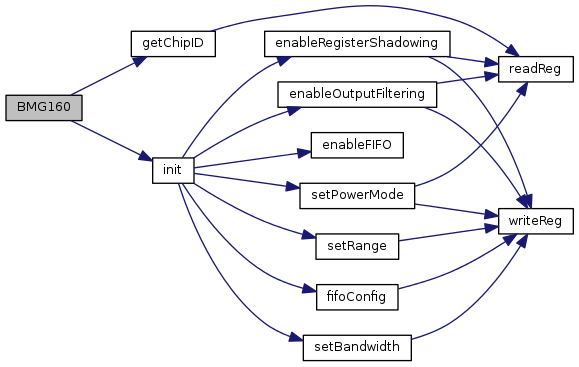
| void update | ( | void | ) |
Update the internal stored values from sensor data.


| uint8_t getChipID | ( | ) |
Return the chip ID.


| void getGyroscope | ( | float * | x, |
| float * | y, | ||
| float * | z | ||
| ) |
Return gyroscope data in degrees per second. update() must have been called prior to calling this method.
| x | Pointer to a floating point value that will have the current x component placed into it. |
| y | Pointer to a floating point value that will have the current y component placed into it. |
| z | Pointer to a floating point value that will have the current z component placed into it. |

| float * getGyroscope | ( | ) |
Return gyroscope data in degrees per second in the form of a floating point array. The pointer returned by this function is statically allocated and will be rewritten on each call. update() must have been called prior to calling this method.
| float getTemperature | ( | bool | fahrenheit = false | ) |
Return the current measured temperature. Note, this is not ambient temperature. update() must have been called prior to calling this method.
| fahrenheit | true to return data in Fahrenheit, false for Celicus. Celsius is the default. |
| void init | ( | POWER_MODE_T | pwr = POWER_MODE_NORMAL, |
| RANGE_T | range = RANGE_250, |
||
| BW_T | bw = BW_400_47 |
||
| ) |
Initialize the device and start operation. This function is called from the constructor so will not typically need to be called by a user unless the device is reset.
| pwr | One of the POWER_MODE_T values. The default is POWER_MODE_NORMAL. |
| range | One of the RANGE_T values. The default is RANGE_250. |
| bw | One of the filtering BW_T values. The default is BW_400_47. |
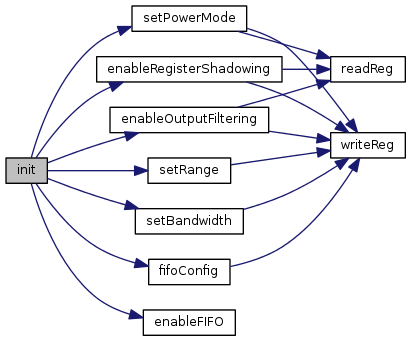
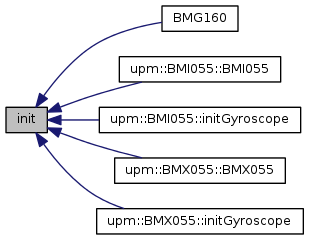
| void reset | ( | ) |
| void setRange | ( | RANGE_T | range | ) |
Set the gyroscope detection scaling range. This device supports 125, 250, 500, 100, and 2000 degree/s ranges.
| range | One of the RANGE_T values. |

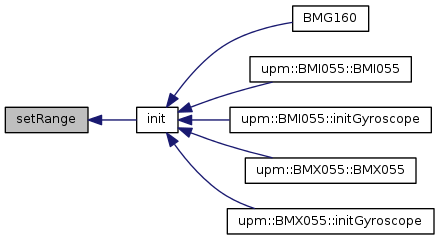
| void setBandwidth | ( | BW_T | bw | ) |
Set the output filtering bandwidth of the device.
| bw | One of the BW_T values. |

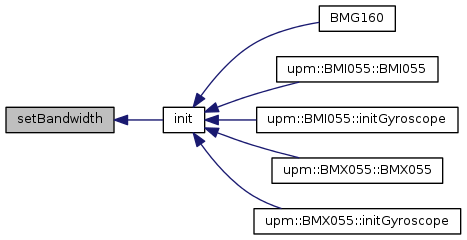
| void setPowerMode | ( | POWER_MODE_T | power | ) |
Set the power mode of the device. Care must be taken when setting a low power or suspend mode. See the datasheet for details. I ncertain power modes, register write must be drastically slowed down. which we cannot support.
| power | One of the POWER_MODE_T values. |

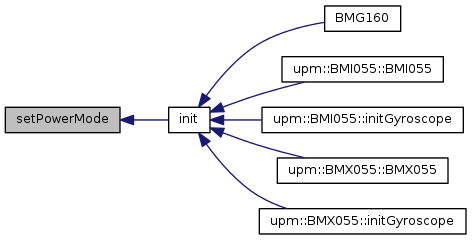
| void enableFIFO | ( | bool | useFIFO | ) |
Enable update() to read from the FIFO rather than the gyroscope axis registers directly. init() enables this mode by default. An advantage to this mode that all axis data is sampled from the same timeslice. When reading directly from the gyroscope output registers, it's possible for one axis to be updated while another is being read, causing a temporal inconsistancy..
Using the FIFO removes this problem.
| useFIFO | true to enable update() to read from the FIFO. When false, update will read from the gyroscope output registers directly. |
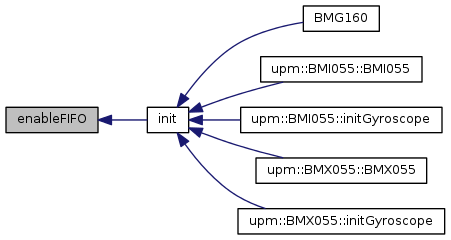
| void fifoSetWatermark | ( | int | wm | ) |
Set the FIFO watermark. When the watermark is reached an interrupt (if enabled) will be generated.
| wm | The FIFO watermark to use. The maximum value is 63. |

| void fifoConfig | ( | FIFO_MODE_T | mode, |
| FIFO_DATA_SEL_T | axes | ||
| ) |
Set the FIFO configuration. init() uses the FIFO_MODE_BYPASS mode with axes set to FIFO_DATA_SEL_XYZ by default.
| mode | One of the FIFO_MODE_T values. |
| axes | One of the FIFO_DATA_SEL_T values. |

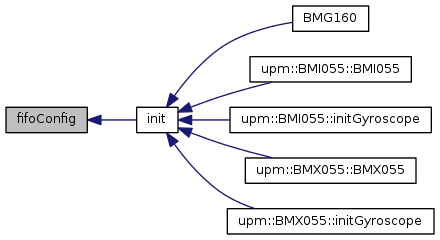
| uint8_t getInterruptEnable0 | ( | ) |
Return the Interrupt Enables 0 register. These resgisters allow you to enable various interrupt conditions. See the datasheet for details.

| void setInterruptEnable0 | ( | uint8_t | bits | ) |
Set the Interrupt Enables 0 register. See the datasheet for details.
| bits | A bitmask of INT_EN_0_BITS_T bits. |

| uint8_t getInterruptMap0 | ( | ) |
Return the Interrupt Map 0 register. These registers allow you to map specific interrupts to the interrupt 1 or interrupt 2 pin. See the datasheet for details.

| void setInterruptMap0 | ( | uint8_t | bits | ) |
Set the Interrupt Map 0 register. These registers allow you to map specific interrupts to the interrupt 1 or interrupt 2 pin. See the datasheet for details.
| A | bitmask of INT_MAP_0_BITS_T bits. |

| uint8_t getInterruptMap1 | ( | ) |
Return the Interrupt Map 1 register. See the datasheet for details.

| void setInterruptMap1 | ( | uint8_t | bits | ) |
Set the Interrupt Map 1 register. See the datasheet for details.
| A | bitmask of INT_MAP_1_BITS_T bits. |

| uint8_t getInterruptSrc | ( | ) |
Return the Interrupt source register. This register allows determining where data comes from (filtered/unfiltered) for those interrupt sources where this is selectable. See the datasheet for details.

| void setInterruptSrc | ( | uint8_t | bits | ) |
Set the Interrupt source register. This register allows determining where data comes from (filtered/unfiltered) for those interrupt sources where this is selectable. See the datasheet for details.
| bits | A bitmask of INT_1A_BITS_T bits. |

| uint8_t getInterruptOutputControl | ( | ) |
Return the Interrupt output control register. This register allows determining the electrical characteristics of the 2 interrupt pins (open-drain/push-pull and level/edge triggering). See the datasheet for details.

| void setInterruptOutputControl | ( | uint8_t | bits | ) |
Set the Interrupt output control register. This register allows determining the electrical characteristics of the 2 interrupt pins (open-drain/push-pull and level/edge triggering). See the datasheet for details.
| bits | A bitmask of INT_EN_1_BITS_T bits. |

| void clearInterruptLatches | ( | ) |
Clear all latched interrupts. See the datasheet for details.

| BMG160::RST_LATCH_T getInterruptLatchBehavior | ( | ) |
Return the current interrupt latching behavior. See the datasheet for details.

| void setInterruptLatchBehavior | ( | RST_LATCH_T | latch | ) |
Set the current interrupt latching behavior. See the datasheet for details.
| latch | One of the RST_LATCH_T values. |

| uint8_t getInterruptStatus0 | ( | ) |
Return the interrupt status 0 register. These registers indicate which interrupts have been triggered. See the datasheet for details.

| uint8_t getInterruptStatus1 | ( | ) |
Return the interrupt status 1 register. See the datasheet for details.

| uint8_t getInterruptStatus2 | ( | ) |
Return the interrupt status 2 register. See the datasheet for details.

| uint8_t getInterruptStatus3 | ( | ) |
Return the interrupt status 3 register. See the datasheet for details.

| void enableRegisterShadowing | ( | bool | shadow | ) |
Enable shadowing of the gyroscope output registers. When enabled, a read of an axis LSB register automatically locks the MSB register of that axis until it has been read. This is usually a good thing to have enabled. init() enables this by default. If disabled, then it becomes possible for part of an axis value to change while another part is being read, causing inconsistent data.
| shadow | true to enable axis register shadowing, false otherwise. |

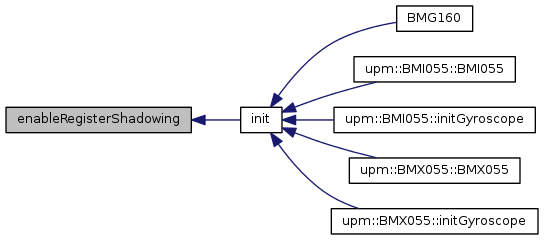
| void enableOutputFiltering | ( | bool | filter | ) |
Enable filtering of the gyroscope axis data. init() enables this by default. If disabled, then gyroscope data that is read will be raw and unfiltered (rated R). See the datasheet for details.
| filter | true to enable filtering, false to disable. |

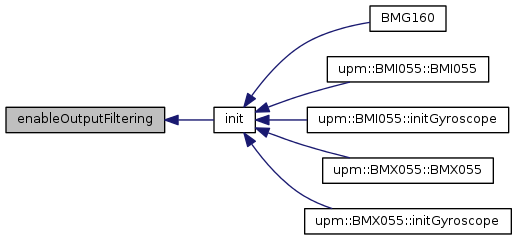
| void installISR | ( | INTERRUPT_PINS_T | intr, |
| int | gpio, | ||
| mraa::Edge | level, | ||
| void(*)(void *) | isr, | ||
| void * | arg | ||
| ) |
install an interrupt handler.
| intr | one of the INTERRUPT_PINS_T values specifying which interrupt pin you are installing. |
| gpio | gpio pin to use as interrupt pin |
| level | the interrupt trigger level (one of mraa::Edge values). Make sure that you have configured the interrupt pin properly for whatever level you choose. |
| isr | the interrupt handler, accepting a void * argument |
| arg | the argument to pass the the interrupt handler |

| void uninstallISR | ( | INTERRUPT_PINS_T | intr | ) |
uninstall a previously installed interrupt handler
| intr | one of the INTERRUPT_PINS_T values specifying which interrupt pin you are removing. |

| uint8_t readReg | ( | uint8_t | reg | ) |
Read a register.
| reg | The register to read. |
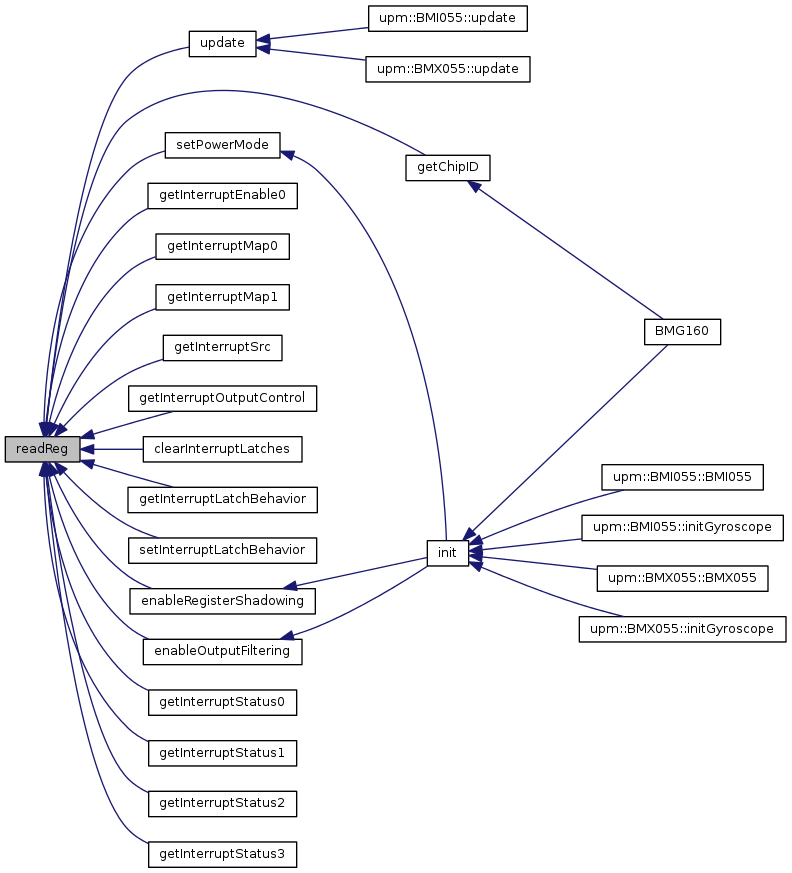
| int readRegs | ( | uint8_t | reg, |
| uint8_t * | buffer, | ||
| int | len | ||
| ) |
Read contiguous registers into a buffer.
| buffer | The buffer to store the results. |
| len | The number of registers to read. |

| void writeReg | ( | uint8_t | reg, |
| uint8_t | val | ||
| ) |
Write to a register
| reg | The register to write to. |
| val | The value to write. |
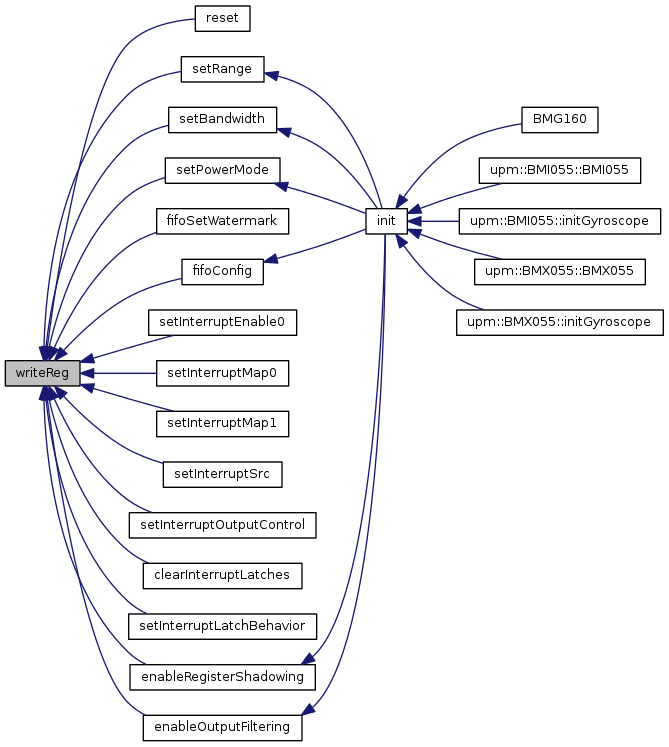
 1.8.6
1.8.6